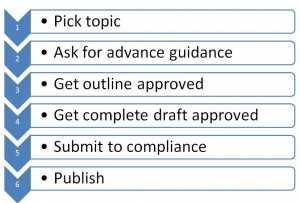7 ways to manage writing by committee
The best way to manage writing by committee? Avoid it. As Ann Handley says in Everybody Writes: Your Go-To Guide to Creating Ridiculously Good Content,
Having a buddy by your side is helpful. Having an entire committee on your back? Not so much.
However, writing in a regulated industry means that many of you must get your materials reviewed by compliance. Also, if you’re a financial marketer, your subject-matter expert will want to check your work.
I have some tips, based on my experience as director of investment communications for an asset management firm.
Tip 1. Develop a process
Haphazardly approaching the review and approval of your project can slow you down as you must think about what’s the next step. Avoid this headache by developing a process. Identify who needs to be involved and when. Also, how long they need for their roles in the process.
For example, reviewing a fund commentary might involve your sending it to a subject-matter expert, then a proofreader, and, finally, your compliance professional, who may bounce it back to you.
If you work as part of a team, put your process into a flow chart to share with team members. Include the names or functions of the people involved, along with how long they’re allowed to respond.
Tip 2. Learn the compliance rules
To reduce the pain of dealing with compliance, learn about the main rules that affect you and develop strategies for dealing with them.
For example, learn which topics trigger the need for disclosures. Then, you can avoid those topics or have boilerplate disclosures handy for tailoring to the content under review.
In general, familiarizing yourself with compliance guidelines will help you to write in a way that minimizes the need for editing by compliance. It’ll also speed your content’s progress through compliance review, especially as your compliance officers develop confidence in you.
Tip 3. Communicate expectations
Tell people what you’re looking for and when you need it.
Don’t invite your subject-matter experts to take an axe to your article. Instead, keep your feedback request as narrow as possible. Ask them to “check for accuracy,” or to answer a specific question. As Ann Handley says, “Please approve is likely to deliver far fewer edits than will please tell me if you have suggestions.”
Tell your subject-matter experts and compliance reviewers about your deadlines. Use the techniques I discussed in tip number eight in “How to get your employees to observe style guidelines.”
Tip 4. Limit rounds of revisions
As Handley says, “One is fine. Five? Nope.” Another Handley suggestion: Get sign-off on an outline before writing a complete draft. “You can often avoid a lot of angst this way,” she says.
Tip 5. Limit the number of reviewers
The fewer your reviewers, the better, at least in the interest of speed and clarity. If you involve more than one subject-matter expert, make sure one has the ultimate power of approval. Otherwise, you may struggle to reconcile conflicting views.
Tip 6. Enforce deadlines
If you have the necessary confidence and authority, try what I think of as the “drop dead” approach to approvals. Tell your subject-matter expert, “If I don’t hear from you by DATE, I’ll assume that you’ve approved this.” Of course, you’ll need backing from higher-ups to enforce this.
Tip 7. Meet in person with the slackers
When I was director of investment communications, I used to walk to the desk of the portfolio manager whose approval I needed. That was often faster than waiting for my emailed request to catch their eyes.
YOUR suggestions?
I’d like to learn your suggestions for managing the approval process. Please comment.
P.S. My assessment of Handley’s book
You’ll enjoy Ann Handley’s Everybody Writes: Your Go-To Guide to Creating Ridiculously Good Content if you enjoy blog-post-length tips about writing, publishing, and marketing. You can sample one chapter and get something out of it.
Disclosure: If you click on an Amazon link in this post and then buy something, I will receive a small commission. I only link to books in which I find some value for my blog’s readers.
Image courtesy of David Castillo Dominici at FreeDigitalPhotos.net






